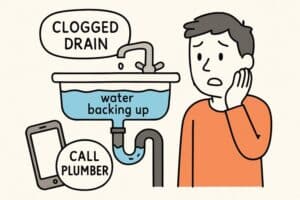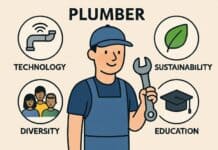Key Takeaways
- Persistent or recurring clogs, multiple clogged drains, and severe backup issues require professional plumbing assistance.
- Slow drains, foul odors, and strange pipe noises indicate deeper clogs or developing plumbing issues.
- Unsuccessful DIY attempts may worsen the problem and lead to costly repairs if not handled by a licensed plumber.
- Preventative measures and regular inspections are crucial for maintaining a healthy plumbing system and avoiding emergencies.
Table of Contents
- Introduction
- Persistent or Recurring Clogs
- Multiple Drains Are Clogged Simultaneously
- Slow Draining Water
- Foul Odors Emanating from Drains
- Gurgling Sounds in Pipes
- Water Backing Up Into Other Fixtures
- Unsuccessful DIY Attempts
- Preventive Measures and Regular Maintenance
Introduction
Clogged drains can create immediate headaches and lead to costly repairs if not handled quickly and adequately. While minor clogs are common and sometimes manageable on your own, it’s essential to recognize when a bigger plumbing issue is at play. Relying on experts like Lutz Plumbing ensures your plumbing system remains in excellent working order and prevents minor annoyances from becoming major disruptions.
Many homeowners attempt DIY methods before calling a professional. However, some clogs hide more severe problems that can cause widespread damage if unchecked. Understanding when it’s best to bring in a professional service can help protect your home, time, and budget in the long run.
Not all plumbing issues are immediately obvious; some may signal larger concerns beneath the surface. Responding quickly to signs of trouble can spare you from expensive damage and health hazards in your home. Here’s how to know when the right time is to call your trusted plumber.
Persistent or Recurring Clogs
When a drain clogs repeatedly, despite attempts to clear it, this typically points to a deeper issue within your pipes, such as buildup in the line or a faulty fixture that requires professional repairs. Ignoring persistent clogs can result in damaged pipes and an increased risk of water backing up into your home. Trained plumbers use cameras and specialized tools to identify the root cause and provide a lasting solution, preventing recurring problems and saving you future frustration.
Multiple Drains Are Clogged Simultaneously
One of the most urgent red flags is the simultaneous clogging of multiple drains, such as the kitchen sink and shower backing up at once. This is often a sign of a blockage in the main sewer line, which, if left unresolved, can result in extensive water damage and unpleasant odors throughout your home. The Environmental Protection Agency highlights that main sewer clogs require immediate professional attention to safeguard health and home infrastructure.
Slow Draining Water
Water draining slowly from sinks, tubs, or showers is more than just an annoyance—an early warning sign of an impending, more stubborn clog. Grease, soap scum, hair, and foreign objects can all build up inside pipes, gradually narrowing the flow until drainage slows or halts altogether. Plumbers are equipped to resolve these blockages quickly, often using hydro-jetting or snaking techniques that restore free-flowing drains without causing pipe damage.
Foul Odors Emanating from Drains
Unpleasant odors from your sinks or bathtubs usually signal decomposing organic material stuck in your pipes, sewer line issues, or even hidden leaks. These unpleasant odors can carry bacteria or toxins into your living environment. Addressing foul smells by contacting a plumber ensures prompt, thorough removal and can reveal larger problems like cracked or leaking pipes. For further information on the hazards of indoor plumbing odors, read the Mayo Clinic’s overview on household air quality:
Gurgling Sounds in Pipes
If you hear bubbling or gurgling noises from your drains or toilets, trapped air in the pipes—often a result of a blockage—is likely the culprit. Gurgling sounds may indicate that water is struggling to get past an obstruction, which can ultimately lead to more severe backups or leaks. Professional plumbers can accurately diagnose pipe noises and remove any hidden blockages in your plumbing system, restoring quiet and efficient operation.
Water Backing Up Into Other Fixtures
Discovering water in places it shouldn’t be, like a tub filling up when the washing machine drains or a sink overflowing when the toilet flushes, points to a significant clog somewhere in your system. These cross-fixture backups are particularly concerning as they may expose you to dirty water and increase the risk of water damage to your home’s floors and walls. It’s essential in these situations to call a plumber immediately so they can isolate and repair the blockage source.
Unsuccessful DIY Attempts
While plenty of over-the-counter solutions and home remedies for minor clogs, persistent or severe blockages won’t yield to these approaches and may be worsened by repeated amateur attempts. Chemical drain cleaners, for example, can damage old or fragile pipes and pollute the environment. If your best efforts have failed to clear the drain, it’s time to call a professional to avoid making the situation worse or causing accidental damage.
Preventive Measures and Regular Maintenance
Preventing clogs in the first place often involves simple steps: avoid pouring grease or coffee grounds down the drain, use mesh guards to keep hair and debris out, and schedule regular professional inspections to catch minor issues early. Routine maintenance with a trusted plumber provides peace of mind and minimizes the risk of major plumbing emergencies down the road. Staying proactive saves on costly repairs and prolongs the life of your plumbing system.
Responding to these warning signs and turning to professionals when necessary ensures dependable water flow, minimizes household risks, and helps avoid inconvenient—and expensive—plumbing disasters.



